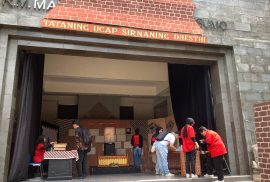Yogyakarta, 18 September 2025 – The Study Program in Javanese Language, Literature, and Culture, Faculty of Cultural Sciences, Universitas Gadjah Mada (FIB UGM), organized the 14th Gugur Gunung Exhibition as part of its annual anniversary celebration. Held on 17–18 September 2025, the exhibition showcased various aspects of Javanese cultural heritage, ranging from manuscript displays and traditional games to traditional musical instruments presented in an interactive manner.
In addition, the exhibition also featured food stands that visitors could enjoy, adding comfort and convenience to the overall exhibition experience.
The Gugur Gunung Exhibition serves as an important platform for academics, students, and the wider community to further appreciate, engage with, and preserve the richness of the Javanese language, literature, and culture. Through this activity, the Study Program in Javanese Language, Literature, and Culture reaffirms its commitment to sustaining traditions while strengthening the relevance of cultural studies in contemporary society.
This initiative aligns with the commitment of FIB UGM to support the Sustainable Development Goals (SDGs), particularly SDG 4: Quality Education through the promotion of inclusive access to cultural learning, and SDG 11: Sustainable Cities and Communities through the preservation of cultural heritage and local traditions as part of the nation’s collective identity.
[Public Relations of FIB UGM, Alma Syahwalani]








